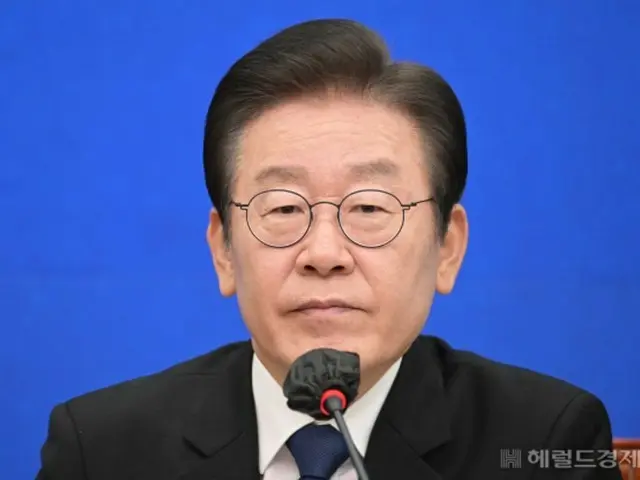Lee is known for repeatedly making harsh remarks about Japan on historical issues, but he expressed the view that cooperation should be seen as a big picture.
Lee's remarks could be seen as a slight attempt to correct course, and as he is the person closest to becoming the next president, attention will be focused on his future actions.
With the release of the president, the presidential election will be held on June 3. The ruling and opposition parties began their internal primary elections on the 15th to select candidates. The Democratic Party of Korea has nominated Lee and Kim Kyung-soo for the primary election.
The governors of South Gyeongsang Province and Gyeonggi Province, Kim Dong-yeon, have announced their candidacy. The election will be held in four regions across the country until the 27th, and the results will be announced based on the combined votes of party members (50%) and public opinion polls (50%).
The presidential candidate will be selected. Lee is the closest to becoming the next president. Lee is leading the approval ratings as a presidential candidate in various opinion polls. The polling company Gallup Korea announced on the 11th
In a survey conducted by the National People's Congress, Lee received 37% approval rating. The highest approval rating among the ruling party's candidates, former Minister of Employment and Labor Kim Moon-soo, was only 9%, and the approval ratings of the ruling party's candidates combined were still lower than Lee's.
The view that his election is "almost certain" is spreading. Lee is a former member of Andong County (now Andong City) in North Gyeongsang Province in the southeast. He grew up in a poor family and worked as a boy factory worker after graduating from elementary school.
He passed the exams to graduate from middle school and high school while working part-time. In 1986, he graduated from Chung-Ang University in Korea and became a lawyer. After that, he moved to Seongnam, Gyeonggi-do, near Seoul.
Nam) He served as mayor from July 1, 2007 to March 15, 2018, and then served as governor of Gyeonggi Province from July 2018 to October 25 last year. He is running for president in 2022 and will support Yoon until the end.
Lee was also under fire for his role as mayor of Seongnam, a suburb of Seoul, for the urban development he implemented.
He was sentenced to one year in prison and two years of probation in the first trial in November last year for making false statements in 2021 when he was a deputy. Both Lee's side and the prosecution appealed the sentence.
On the 26th of last month, the Supreme Court acquitted Lee of the charge of publishing false facts under the Public Offices Election Act. If he is found guilty of violating the Public Offices Election Act, he will be barred from running for public office, including the presidential election, for five years.
The acquittal has freed Lee from the "judicial risk" for the time being. Lee formally announced his candidacy for the presidential election on the 10th of this month through a video message.
On the following day, the 11th, he held a press conference and announced his administration's vision. He said that he would "open up a new era of the K-Initiative" to lead the world in the fields of culture, science and technology, but made no comments about Japan.
Lee is known for his repeated anti-Japanese behavior. During his time as governor of Gyeonggi Province, he launched the "Pro-Japanese Remnants Project" to thoroughly eliminate all pro-Japanese elements from the province.
In 2016, while he was mayor of Seongnam, he participated in a sit-in in front of the Japanese Embassy in Seoul to protest against the agreement on the comfort women issue that had been reached the previous year between Japan and South Korea.
When the new administration came into power, they labeled it a "pro-Japanese, traitorous government" and repeatedly criticized it. In August of last year, when the Japanese government decided to release treated water from the Fukushima Daiichi Nuclear Power Plant into the ocean, they made comments such as "contaminated water terrorism" and "a second Pacific
He incited anti-Japanese sentiment, calling it a "war," and even went on a hunger strike in protest. However, with an eye on the presidential election, Lee has recently made statements that could be interpreted as an attempt to change course from his anti-Japanese stance.
In the video announcing his candidacy, he said, "Realistically speaking, the ROK-US alliance and ROK-US-Japan cooperation are extremely important." With the presidential election in sight, he is conscious of young people and independent voters who dislike left-wing tendencies.
On the 15th, in a YouTube channel run by the memorial foundation of the late President Roh Moo-hyun, he spoke about the relationship with Japan, saying, "Past historical issues, Liancourt Rocks,
"We are very critical of Japan's words and actions regarding the issue of Takeshima, the Korean name for the islands, but we must cooperate in the big picture," he said, adding, "We must do the same (take a critical stance) in economic, cultural and social aspects as well."
"I don't think there is any need to do that," he said. He added, "We need to respect the ROK-U.S. relationship, build a strong cooperative relationship between ROK-U.S. and Japan, and also manage our relations with Russia and China."
In response to these remarks, South Korea's public broadcaster KBS said, "This is being seen as a pragmatic diplomatic approach that 'pursues practical benefits while adhering to principles.'"
Now that the possibility of him becoming a leader in the world is growing, and the world situation is in turmoil, he may have felt that he can no longer survive with his previous "one-sided anti-Japanese" stance.
It will be interesting to see how this develops.
2025/04/17 13:32 KST
Copyrights(C)wowkorea.jp 5

